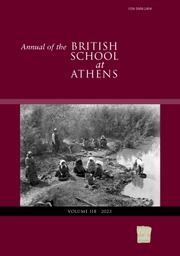No CrossRef data available.
Article contents
The Process of Tradition in Greece
Published online by Cambridge University Press: 11 October 2013
Extract
The word ‘tradition’, used to mean either the process of oral transmission or the story so transmitted, may cover two things: the oral relation from man to man of real events with the possible value of such traditions for history, and this amounts to the study of what is called folk-memory, or the transmission of legends dealing with such supernatural happenings as no one is likely to regard as true. This paper deals exclusively with the latter.
We read and are taught from our childhood legends of the gods and heroes of Greek and Roman mythology, to say nothing of the legends of our own northland. These legends are set down in books, but it is reasonable to ask what relation these written stories bear to what in earlier ages was actually told and more or less believed by people in different parts of the country concerned and at different periods. How far was a legend always told in the form in which we happen to find it recorded? We are, I believe, too prone to look upon a legend as having been always a fixed and so to say canonical story, although we have in fact no lack of hints that legends admit of the widest variations.
- Type
- Research Article
- Information
- Copyright
- Copyright © The Council, British School at Athens 1937
References
page 50 note 1 Relevant passages are quoted in Palestine Pilgrims' Text Soc, Anonymous Pilgrims, I–VIII (1894), p. 3: Tudebove, ed. De Vogüé, p. 414, and Thietmar, ed. J. C. M. Laurent, c. XXII (not VIII) and XXIII.
page 50 note 2 Gulielmi de Baldinsel, Hodoeporicon ad Terrain Sanctam, in Canisii, , Lectiones Antiquae IV p. 344.Google Scholar
page 50 note 3 Palestine Pilgrims' Text Soc. edition, p. 87.
page 50 note 4 Early English Text Soc.'s edition (1919), p. 40.
page 50 note 5 Rev. de l'orient latin III (1895) p. 232.
page 51 note 1 In Canisii, Lectiones Antiquae VI.
page 51 note 2 Viaggio de Frescobaldi, Roma, 1818, p. 122.
page 51 note 3 Rev. de l'orient latin, III (1895) p. 608.
page 51 note 4 Edition of Soc. d. anc. textes Français, 1878, p. 49.
page 51 note 5 Andanças e Viajes, 1874, p. 92. In Letts' translation, p. 82.
page 52 note 1 In Stuttgart 1849 edition III p. 453. In Palestine Pilgrim's Text Soc.'s translation II p. 551.
page 52 note 2 Viaggio da Venezia, by R. P. Fra Noe. Lucca, c. 1620.
page 52 note 3 Viaggi, Roma, 1679, p. 143.
page 54 note 1 Herodotus, 2, 53.
page 54 note 2 In Diel's Poet, philos. Fragm., p. 39.




